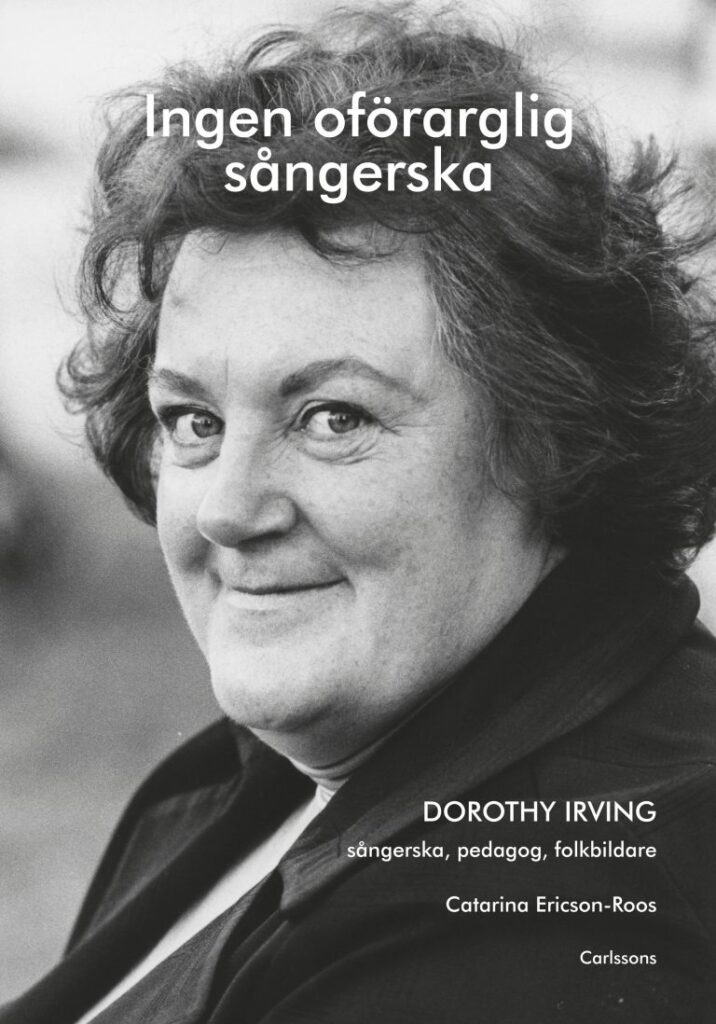The other week, I was commissioned to write a biographical text about Professor Dorothy Irving, an extraordinary singer and voice coach who devoted her career to the awareness and development of communication between stage performers and their audience.
For more than a decade, Dorothy Irving toured up and down the country performing classic works by composers like Franz Schubert and Johannes Brahms as well as premiering works by contemporary Swedish composers such as Bo Linde, Maurice Karkoff and Sven-Eric Johanson. What strikes me in particular is her combined dedication to contemporary music and to making sure that music is understood and enjoyed by as many people as possible.
In the 1960s, as she rose to fame and gave an increasing number of concerts, she realised that a majority of her audience seemed familiar with the music she performed to almost a kind of dullness or boredom. This feeling inspired her to start talking about the music she sang – in concert – effectively, as she herself put it, inviting the audience into a community with the performers instead of being simply passive recipients.
We musicians are first and foremost members of society. Society’s most important elements are its inhabitants. Music’s raison d’être is to be a method of communication between these inhabitants. Being an artist, can you imagine a more enjoyable and challenging task than to try and utilise music in service of communication? Hardly.
Dorothy Irving (trans. David Saulesco), “Musiken, artisten, publiken” (1977)
The above is a quote from Dorothy Irving’s first text on stage communication, published in 1977. (Translated by me – ironically – from Swedish to English, even though it was written in Swedish by an individual whose first language was English and translated by another individual whose first language is Swedish.) Her second text was published ten years later. Early on, she started teaching the art of stage communication, first privately and soon enough she started getting invitations from the prominent Nordic music universities.
Having read a (proper) biography on Dorothy Irving and listening to a delightful radio documentary about her, as well as hearing about her from one of her many former students, I cannot help but feel animated (even more beautifully expressed in Swedish: “besjälad“, literally “given soul”) by her vision and dedication. I feel in her a kindred spirit in wanting to work toward getting more people to understand and appreciate more kinds of music.
The biography’s author writes in her foreword that she didn’t want to write a hagiography about Dorothy Irving, but that it was really difficult to avoid as “no one had anything bad to say about her”. In that same spirit of not wanting to canonise a person who certainly was complex and flawed like all of us, I do not want to project feelings or ideals onto her simply because I identify with these select parts of her life and career. Nevertheless, I have found a new idol. And if nothing else, I am far from alone in feeling that way.

And finally, on a completely unrelated note: If you want something new to listen to and you don’t know what, you could do far worse than extraordinary composer Michael Giacchino‘s original concept album Travelogue volume 1. Described by Giacchino himself as a kind of hommage to Juan García Esquivel or Arthur Lyman with a retro sci-fi twist, on the surface it is little else than easy listening-adjacent lounge music. But, at least to me, Giacchino’s own joy shines through and is amplified by his sheer skill as a craftsman, elevating the music to more than just noise or filler.
Of course, your mileage may vary. And this surely taps into a certain brand of nostalgia for people born in the 1960 like Giacchino that is alien to children of the 1980s like me. In fact, he describes the project as wanting to “just reach back into those days when I used to love sitting in front of a record player and imagining my own version of whatever art they were giving me”.
What do you think?
